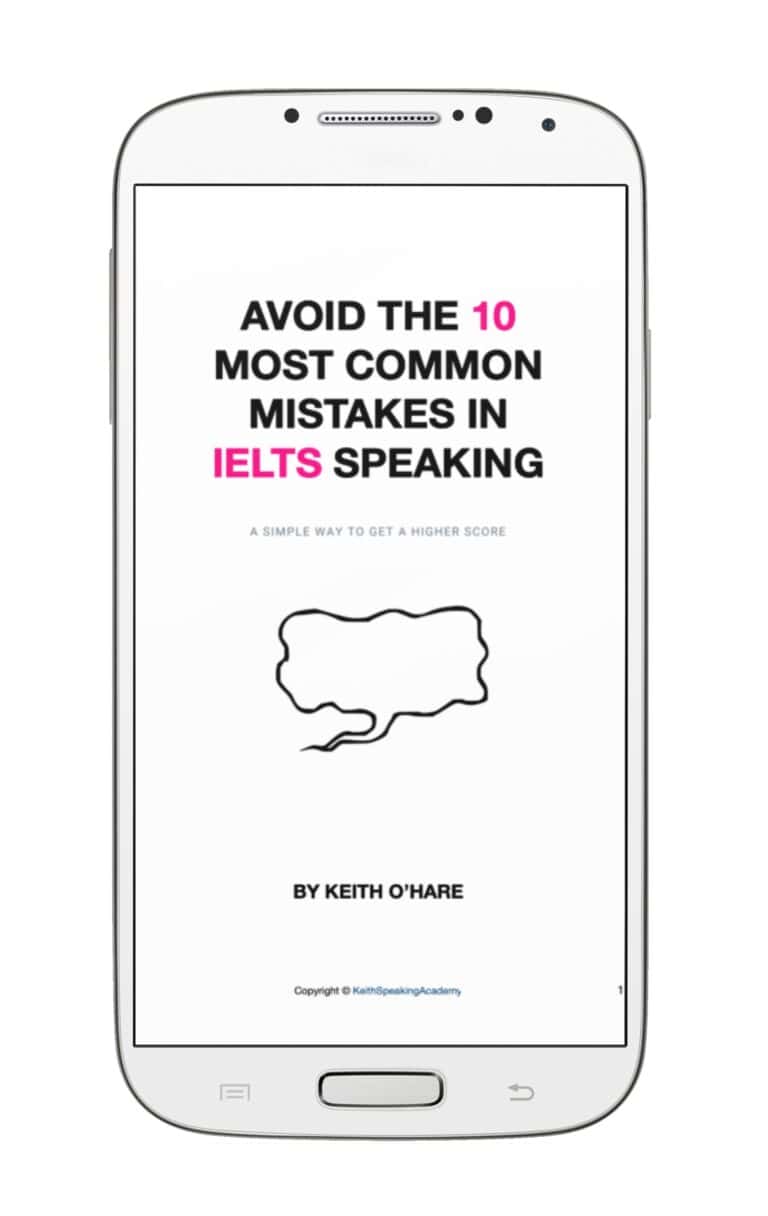Download this IELTS Speaking Lesson PDF
Table of Contents
IELTS Speaking Questions and Answers
How can I know my ability or level?
- Do a mock test – practice test.
- You can find a teacher online to do one, or use an online service likes
www.takeielts.net
Can I move from Band 3 to Band 8 in 2 years?
- To move one Band in IELTS you need about 150 hours of ‘guided’ learning (advice from Cambridge Assessment)
- It depends on how many hours a week you learn
Can I ask the examiner to repeat different questions three times?
- Sure, no problem.
10 is too many, but 3 is fine. - It’s better to use some time and understand than to
misunderstand a question. - If you want to ask the examiner to repeat, you can use one of the following:
Could you repeat that?
I didn’t catch that, could you repeat it?
Would you mind repeating that?
What are pronouns?
- Pronouns replace nouns or noun phrases
Examples of Nouns
- Keith
- Manchester
- sugar
- cars
Examples of Pronouns (these are personal pronouns, but there are
also other types of pronouns)
- I, you, he, she, it, they
- Me, you, him, her, them
How to recover if you go blank during the speaking test?
- Take a deep breath.
- Forget everything you said, it doesn’t matter what happened.
- Ask the examiner to repeat the question.
- Pause and take your time.
- Take 2 or 3 seconds to think and relax then push forward.

Tomorrow is my IELTS listening, reading, and writing test, please
suggest a specific strategy to get the desired score.
- All you can do is the preparation at least 3 months before your exam.
Find a teacher or somebody who can help you see your weaknesses,
where you need to focus, and tell you the gap between where you are
now and where your desired score is and help you get that. - Strategy is all about practice. Keep going every day because it’s a long-term investment in your studies.
- If your exam is tomorrow, then relax this evening. It’s a marathon test,
you need the energy and focus, so do not study tonight, instead
do something enjoyable in English and get yourself mentally prepared.
Would you please mention eye contact during the speaking test?
- Eye contact in the speaking test is the same as eye contact in real life.
- Eye contact is important when you’re speaking to anybody whether it’s
an interview, meeting, talking with friends or the IELTS Speaking test. - It’s important because it’s a key part of your communication. I suggest
you look at the examiner and make some eye contact during the test. (Not
staring all the time, because will make them feel uncomfortable.) - It’s not a criteria in IELTS speaking but it is a criteria for good communication skills and you should develop those skills.
How can I predict all topics in IELTS speaking?
- You can’t. The topics change every four months.
- Some of the previous topics stay the same. There will be some new
topics and there will be some recycling of old topics. - When you prepare, just study a wide range of topics so you’re familiar
with all the different topics we talk about in daily life. - By looking at past topics, you can get an idea. But, I suggest that you
focus on getting better at English and learning the exam techniques.

IELTS Speaking Language Tips
In this section I am going to give some tips for learning vocabulary, looking here at prefixes. These are a great way to expand your vocabulary
very quickly.
Meaning of Prefixes
Several letters (or a phoneme) before a word that change its meaning
For example,
Understand …..misunderstand
Note, we also have suffixes which are several letters (or a phoneme) after a word that change its meaning
Examples of Common Prefixes
Pre = before
- Preschool (adj. / n.)
A preschool child is around 3 – 5 years old.
- Pre-meeting (adj.)
Let’s go for a pre-meeting coffee
- Precooked (adj.)
- Pre-cook (v.)
I took a precooked chicken to the picnic.

Post = later, after
- Post-meeting (adj.)
Let’s have a post-meeting discussion.
- Postpone (v.) = delay
- Postgraduate (n.)
People taking a Master’s degree or a PHD are postgraduates.
- Post-mortem
After he died, the police needed to do a post-mortem to find the cause of
death.
Other Prefixes:
Mis = wrongly
- Misunderstand
- Misinformation
There is a lot of misinformation on some social media channels.
Dis = opposite / not
- Disagree (v.)
- Dishonest (adj.)
Over = too much
- Overcook (v.)
- Overweight (adj.)
- Overreact (v.)
I am only 2 minutes late, why are you so angry? I think you are
overreacting.
Under = too little
- Undercook (v.)
- Underestimate (v.)
I like to eat pasta that is a little undercooked; ‘al dente’ as they say in
Italy
Re = again
- Rewrite
- Reread
- Redo
- Reuse
To save the planet we need to reuse, reduce and recycle

More Free Lessons
If you liked this lesson, leave a comment below!
There are more lessons you can follow in the links below too.
CELEBRATIONS in IELTS Speaking. Vocabulary you need to talk about different celebrations.
SKILLS in IELTS Speaking. Learn the collocations and adjectives to talk about skills we learn and need.
BOOKS in IELTS Speaking. Powerful idioms and expressions to talk about the kind of reader you are, and the things you like to read.

